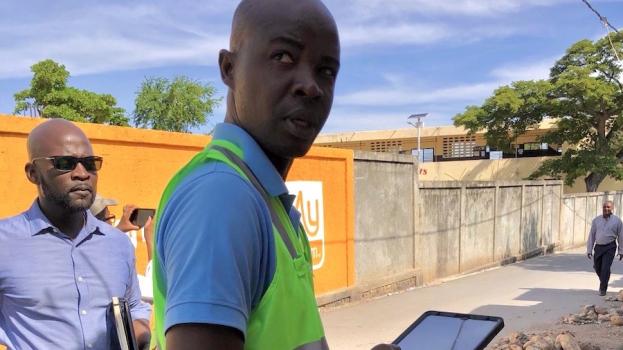Seeking Sustainability in Water Service Delivery in Haiti
In September, we had the opportunity to visit Jeremie, Haiti, to see the progress of USAID’s Water and Sanitation (WatSan) Project. The project works with municipal water utilities to build staff capacity, rehabilitate infrastructure, and improve operations. One of the main problems with Jeremie’s water system is the high rate of non-revenue water (NRW)—that is, water that enters the system but does not reach paying customers. The Jeremie water system has 2,100 household connections, yet only 800 customers pay, and many of the public kiosks are not operational. To combat the added challenge of NRW losses caused by leaks in the pipe network, WatSan has begun helping the water utility locate and repair these leaks.
During our visit, the Technical Director of the Jeremie utility Jocelyn Laurent took us to a site to observe leak detection and repair work. Utility staff is directly implementing this work, and USAID’s WatSan project supplies the required materials. WatSan has also worked with mWater to add a new module to its open-source platform to allow utilities to better map and manage water systems. The project rolled out the new module and trained utility staff on its use at an August workshop. During our visit, Mr. Laurent demonstrated how the utility uses the mWater platform to log the repair work, including location coordinates, materials used, and photos.
Before they began using the mWater platform, Haiti’s water utilities had no system of knowledge management, depending instead on the memories of the responsible staff. Now they log the work directly into mWater, and the updated information becomes part of the system’s record. By equipping local water utilities with the right tools and knowledge to sustainably deliver services, the USAID Water and Sanitation Project is helping these institutions along the road to self-reliance.
The WatSan Project, implemented by DAI, was launched in December 2017, with the objective of increasing sustainable water and sanitation services in urban areas of Haiti. For more information on the Haiti Water and Sanitation Project, visit the project page on Globalwaters.org or contact Marcia Glenn.
By Elizabeth Jordan and Stephanie Maurissen, USAID Water Office


